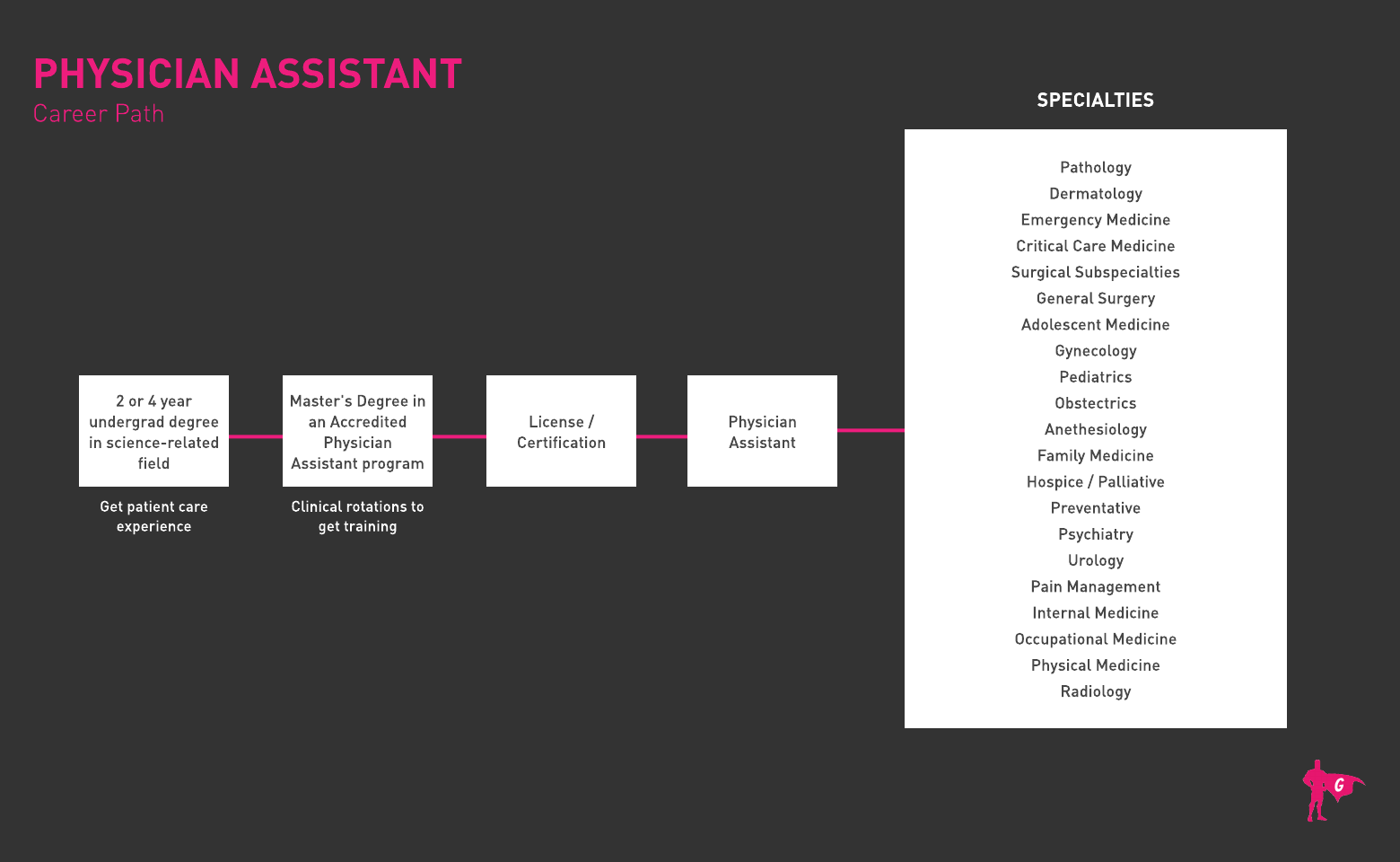Reflektory
Cardiology Physician Assistant, Certified Physician Assistant (PA-C), Emergency Medicine Physician Assistant (Emergency Medicine PA), Family Practice Physician Assistant, Orthopaedic Physician Assistant, Orthopedic Physician Assistant, Physician Assistant (PA), Physician's Assistant, Surgical Critical Care Physician Assistant (Surgical Critical Care PA), Surgical Physician Assistant (Surgical PA)
Asystenci lekarzy świadczą usługi opieki zdrowotnej zazwyczaj wykonywane przez lekarza, pod nadzorem lekarza. Przeprowadzają pełne badania lekarskie, zapewniają leczenie i doradzają pacjentom.
- Pomaganie ludziom wyzdrowieć i być zdrowym
- Dobre wynagrodzenie
- Wysoki popyt
- Dobra równowaga między pracą a życiem prywatnym
- Pobieranie lub przeglądanie historii medycznej pacjentów
- Badanie pacjentów
- Zamawianie i interpretacja badań diagnostycznych, takich jak prześwietlenia lub badania krwi
- Zdiagnozowanie urazu lub choroby pacjenta
- Prowadzenie leczenia, np. nastawianie złamanych kości i szczepienie pacjentów.
- Edukowanie i doradzanie pacjentom i ich rodzinom - na przykład odpowiadanie na pytania dotyczące opieki nad dzieckiem chorym na astmę.
- Przepisywanie leków
- Ocena i rejestracja postępów pacjenta
- Badania nad najnowszymi metodami leczenia w celu zapewnienia wysokiej jakości opieki nad pacjentami
- Prowadzenie lub uczestnictwo w programach informacyjnych, rozmawianie z grupami na temat radzenia sobie z chorobami i promowanie dobrego samopoczucia.
Asystenci lekarzy pracują w zespołach z lekarzami lub chirurgami i innymi pracownikami służby zdrowia. Ich konkretne obowiązki i zakres, w jakim muszą być nadzorowani przez lekarzy lub chirurgów, różnią się w zależności od stanu.
W niektórych obszarach, zwłaszcza na obszarach wiejskich i w społecznościach o niedostatecznym dostępie do usług medycznych, asystenci lekarzy mogą być dostawcami podstawowej opieki zdrowotnej w klinikach, w których lekarz jest obecny tylko 1 lub 2 dni w tygodniu. W tych lokalizacjach asystenci lekarzy współpracują z lekarzem w razie potrzeby i zgodnie z wymogami prawa.
Kliknij tutaj , aby przeczytać Dzień z życia neurohospitalisty PA
Podobnie jak lekarze, asystenci lekarzy mogą specjalizować się w specjalnościach medycznych:
- Patologia
- Dermatologia
- Medycyna ratunkowa
- Medycyna opieki krytycznej
- Podspecjalizacje chirurgiczne
- Chirurgia ogólna
- Medycyna młodzieżowa
- Ginekologia
- Pediatria
- Położnictwo
- Anetezjologia
- Medycyna rodzinna
- Hospicjum / opieka paliatywna
- Zapobiegawczy
- Psychiatria
- Urologia
- Zarządzanie bólem
- Medycyna wewnętrzna
- Medycyna pracy
- Medycyna fizyczna
- Radiologia
- Komunikacja z pacjentem i zespołem opieki: Jasna i pełna współczucia komunikacja z pacjentami i ich współpracownikami w często stresujących warunkach.
- Umiejętności analityczne
- Umiejętności interpersonalne
- Umiejętności techniczne
- Zorientowanie na szczegóły
- Silne podstawy matematyki i nauk ścisłych
- Uczenie się przez całe życie
- Silna etyka pracy
- Gabinety lekarskie
- Szpitale
- Ośrodki opieki ambulatoryjnej
- Usługi edukacyjne; państwowe, lokalne i prywatne
Praca na nogach przez dłuższy czas w ciągu dnia
- Uwielbiał pomagać ludziom
- Lubiłem rozmawiać z ludźmi z różnych środowisk.
- Był zainteresowany tematyką zdrowia i dobrego samopoczucia
- Lubił zajęcia z matematyki i nauk ścisłych
"Myślę, że to, co napędza każdego w medycynie, to zainteresowanie nauką i pomaganie ludziom. W medycynie ratunkowej spotykasz się z ludźmi w jednym z najgorszych dni w ich życiu, a umiejętność szybkiego myślenia i współczucia jest kluczowa. Ludzie pracujący w medycynie są zwykle ciekawscy, lubią zadawać pytania i zagłębiać się w problem, ponieważ medycyna polega na naprawianiu tego, co możemy". Cyndy Flores, Senior Director Advanced Providers, Vituity
- Asystenci lekarzy (PA) muszą posiadać tytuł magistra w PA Studies, akredytowany przez Accreditation Review Commission on Education for the Physician Assistant, Inc.
- Stopnie licencjackie różnią się, ale muszą zapewniać wystarczające przygotowanie do rygorystycznego programu PA. Popularne kierunki studiów licencjackich obejmują anatomię, biologię, nauki o zdrowiu, chemię, mikrobiologię i fizjologię. Wielu kandydatów na studia musi spełnić wymagania wstępne, aby się zakwalifikować, jeśli nie wzięli udziału w odpowiednich zajęciach przygotowawczych
- Wspólne wymagania wstępne to anatomia, chemia ogólna, fizjologia, mikrobiologia, statystyka i psychologia ogólna.
- Ponadto, kandydaci na studia PA potrzebują rzeczywistego doświadczenia w opiece nad pacjentem. Dlatego nierzadko studenci PA mają doświadczenie w pracy jako zarejestrowane pielęgniarki, ratownicy medyczni lub ratownicy medyczni
- Niektórzy kandydaci zdobywają doświadczenie w opiece nad pacjentami w ramach wolontariatu.
- Programy studiów magisterskich obejmują nauczanie w klasie i laboratorium w zakresie patologii, anatomii człowieka, fizjologii, medycyny klinicznej, farmakologii, diagnostyki fizycznej i etyki medycznej
- Inne szkolenia obejmują nadzorowane staże kliniczne w placówkach takich jak medycyna rodzinna, medycyna wewnętrzna, medycyna ratunkowa i pediatria.
- Wszystkie stany wymagają od asystentów medycznych zdania egzaminu National Commission on Certification of Physician Assistants' Physician Assistant National Certifying Examination (PANCE). Ci, którzy zdadzą egzamin, otrzymują tytuł "Physician Assistant - Certified" i mogą ubiegać się o licencję
- Egzamin PANCE jest trudny, ale ma wysoki wskaźnik zdawalności dla osób przystępujących do niego po raz pierwszy (od 98% w 2018 r. do 93% w 2021 r.).
- Certyfikowani PA muszą utrzymywać aktualność poprzez ustawiczne kształcenie oraz ponowne przystępowanie do egzaminu co dekadę
- Kryteria licencyjne wymagają również, aby PA zawarli umowę z lekarzem nadzorującym
- Istnieje kilka dodatkowych certyfikatów, które PA mogą zdobyć, takich jak:
▸Certyfikacja specjalisty CPD w dziedzinie opieki zdrowotnej
Pracownik działu CPD w sektorze opieki zdrowotnej
Certyfikacja techniczna w zakresie neurofeedbacku
Certyfikat w zakresie biofeedbacku dysfunkcji mięśni miednicy ▸Board Certified in Pelvic Muscle Dysfunction Biofeedback
Certyfikat zarządu w zakresie neurofeedbacku
▸ Certyfikacja techniczna w zakresie biofeedbacku
- Certification Board for Sterile Processing and Distribution - Certyfikowany technik chirurgii ambulatoryjnej
- National Alliance of Wound Care and Ostomy - Certyfikacja w zakresie opieki nad ranami
- National Board for Certification of Orthopaedic Physician's Assistants - Certyfikacja asystentów lekarzy ortopedów
- National Commission on Certification of Physician Assistants (Krajowa Komisja ds. Certyfikacji Asystentów Lekarskich ) -
▸Certyfikowany asystent lekarza - kardiochirurgia i torakochirurgia
▸Certyfikowany asystent lekarza - medycyna szpitalna
▸ Certyfikowany asystent lekarza - psychiatria
▸Certyfikowany asystent lekarza - nefrologia
▸ Certyfikowany asystent lekarza - chirurgia ortopedyczna
▸ Asystent lekarza - certyfikowany
▸ Certyfikowany asystent lekarza - medycyna ratunkowa
▸Certyfikowany asystent lekarza - pediatria
▸Certyfikat dodatkowych kwalifikacji: Elektroniczne monitorowanie płodu
▸Certyfikat dodatkowych kwalifikacji w zakresie transportu pediatrycznego noworodków
- Korporacja Certyfikacji Dostępu Naczyniowego - Dostęp Naczyniowy - Certyfikowany przez Radę ds.
- Praca jako ratownik medyczny , zarejestrowana pielęgniarka, asystentka pielęgniarska lub na podobnym stanowisku związanym z opieką.
- Wolontariat w szpitalach lub klinikach, praca z grupami o specjalnych potrzebach lub grupami ryzyka, takimi jak osierocona młodzież lub bezdomni.
- Aby dostać się na studia magisterskie, kandydaci na PA potrzebują rzeczywistego doświadczenia w opiece nad pacjentami. Wiele osób zdobywa doświadczenie pracując jako EMT, ratownik medyczny, zarejestrowana pielęgniarka lub asystentka pielęgniarska
- Wystarczający odpowiedni wolontariat może być wystarczający, aby zakwalifikować się do przyjęcia na studia magisterskie PA, ale sprawdź w programach, którymi jesteś zainteresowany
- Odpowiednie doświadczenia wolontariackie mogą obejmować pracę w szpitalach, klinikach, domach opieki lub miejscach sponsorowanych przez rząd (takich jak schroniska dla bezdomnych).
- Weź udział w zajęciach przygotowujących do studiów w szkole średniej, w tym z anatomii, fizjologii, biologii, matematyki, języka angielskiego i komunikacji. Ucz się ciężko, aby zdobywać dobre oceny, dzięki czemu będziesz mógł zostać przyjęty do odpowiedniego programu studiów.
- Cień lub rozmowa z pracującym PA
- Zastanów się, jaki kierunek studiów licencjackich chcesz wybrać. Upewnij się, że obejmuje on niezbędne warunki wstępne do późniejszego rozpoczęcia studiów magisterskich
- Dołącz do odpowiednich klubów studenckich i uczestnicz w organizacjach zawodowych, takich jak American Academy of PAs (zobacz naszą listę Zasoby > Strony internetowe).
- Przeczytaj lub obejrzyj wywiady z PA i dowiedz się o ich różnych codziennych obowiązkach.
- Zastanów się, gdzie chcesz pracować. PA są zatrudniani w gabinetach lekarskich, szpitalach, ośrodkach opieki ambulatoryjnej, agencjach rządowych i usługach edukacyjnych
- Rozważ pisanie artykułów do publikacji na stronach internetowych poświęconych opiece zdrowotnej i w czasopismach drukowanych! Punkty za pisanie zawsze świetnie wyglądają w CV!
- Dowiedz się o konkretnych wymaganiach licencyjnych dla stanu, w którym planujesz pracować.
- Trzymaj się z dala od kłopotów, aby przejść kontrolę przeszłości (jeśli dotyczy)!
- Opracuj osobisty harmonogram treningów, abyś mógł pozostać w formie i pomagać pacjentom, gdy zajdzie taka potrzeba.
"Oczywiście, uczęszczaj na kursy naukowe i studiuj. Bądź wolontariuszem! Bądź wolontariuszem w szpitalach, domach opieki, na targach zdrowia, w schroniskach dla bezdomnych lub na misjach medycznych. Większość z nich nie wymaga żadnej wiedzy medycznej, ale są to miejsca, które potrzebują pomocy i dla każdego znajdzie się miejsce. Innym świetnym pomysłem jest dołączenie do grup "pre-PA", aby nadal uczyć się o zawodzie, a jeśli znajdziesz okazję, obserwuj PA (lub więcej) podczas pracy, aby lepiej zrozumieć, na czym polega ta rola ". Cyndy Flores, starszy dyrektor ds. zaawansowanych dostawców, Vituity

- Zbuduj silne więzi podczas praktyki klinicznej. Często rotacje kliniczne prowadzą do stałego zatrudnienia.
- Szukaj ofert pracy na Indeed, Simply Hired, Glassdoor lub innych popularnych portalach z ofertami pracy.
- Utwórz profesjonalne konto LinkedIn i wymień wszystkie swoje doświadczenia.
- Zachowaj również profesjonalizm w mediach społecznościowych. Potencjalni pracodawcy mogą zrobić mały research online na temat kandydatów
- Zdobądź certyfikat specjalizacji, aby zwiększyć swoje referencje (lista opcji znajduje się w zakładce Wymagana edukacja).
- Według Bureau of Labor Statistics, w nadchodzących latach usługi PA będą coraz bardziej potrzebne, aby pomóc starzejącej się populacji Ameryki, ponieważ ludzie żyją i pozostają aktywni dłużej. Dlatego też specjalizacje związane z geriatrią mogą być obszarami, na których warto się uczyć
- Zaangażuj się w działalność organizacji zawodowych. Bierz udział w wydarzeniach, oferuj gościnne wystąpienia i nawiązuj kontakty z innymi!
- Udaj się tam, gdzie jest najwięcej miejsc pracy dla PA! Stany o największej koncentracji miejsc pracy dla asystentów lekarzy to Connecticut, Maryland, Nowy Jork, Alaska i Karolina Północna. Najwyższy poziom zatrudnienia występuje w Kalifornii, Nowym Jorku, Teksasie, Pensylwanii i na Florydzie
- Zapoznaj się z szablonami CV dla asystentów lekarzy, aby uzyskać pomysły na formatowanie i frazowanie.
- Przejrzyj przykładowe pytania na rozmowę kwalifikacyjną z asystentem lekarza
- Upewnij się, że przeprowadziłeś kilka próbnych rozmów kwalifikacyjnych i pamiętaj, aby ubrać się tak, aby odnieść sukces!
"Wspaniałą rzeczą w pracy PA.... jest to, że jest więcej miejsc pracy niż PA! Jest to jeden z najszybciej rozwijających się zawodów medycznych w USA, więc znalezienie pracy nie jest zwykle trudne. Nie martw się, jeśli nie jest to Twoja wymarzona praca, to przyjdzie. Mówię jednak ludziom, aby znaleźli pracę, w której czują się dobrze, szukają swojej rodziny zawodowej i w przeciwieństwie do zwykłej rodziny, mogą wybrać swoją rodzinę zawodową". Cyndy Flores, starszy dyrektor ds. zaawansowanych dostawców, Vituity
Strony internetowe
- Komisja Przeglądu Akredytacyjnego ds. Edukacji Asystentów Lekarzy (Accreditation Review Commission on Education for the Physician Assistant)
- Amerykańska Akademia Asystentów Anestezjologów
- Amerykańska Akademia PA
- Amerykańskie Stowarzyszenie Lekarzy Pielęgniarek
- Amerykańskie Stowarzyszenie Asystentów Lekarzy Chirurgów
- Amerykańskie Stowarzyszenie Pielęgniarek
- Amerykańskie Towarzystwo Onkologii Klinicznej
- Stowarzyszenie asystentów lekarzy neurochirurgów
- Stowarzyszenie Podyplomowych Programów Asystentów Lekarzy
- Zostań asystentem lekarza
- Krajowa Komisja ds. Certyfikacji Asystentów Lekarskich
- Stowarzyszenie Edukacji Asystentów Lekarzy
- Życie PA
- Platforma PA
Książki
- Medycyna kliniczna dla asystentów lekarzyJames Van Rhee MS PA-C DFAAPA, et al.
- Przewodnik po oświadczeniach osobistych dla asystentów lekarzy: Wskazówki, triki i techniki pisania eseju do szkoły PA, Savanna Perry, PA-C (Autor)
- Podręcznik wnioskodawcy programów asystentów lekarzy 2022, autorstwa Marka Volpe PA-C i Brittany Hogan PA-C
Kanał informacyjny

Polecane oferty pracy

Kursy i narzędzia online








